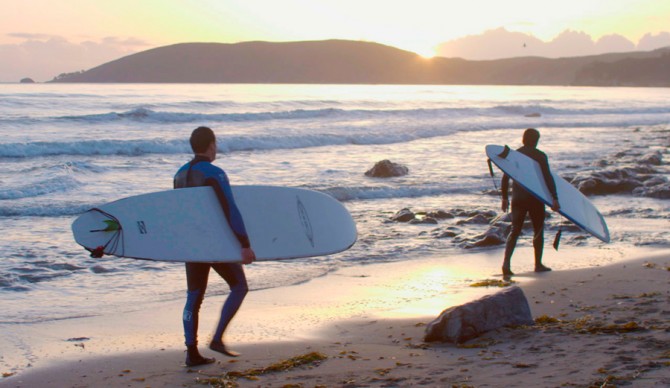
Photo: Resurface
Many who spend time in and around the water already know intuitively that surfing, and the ocean, are curative. And now there is a growing body of evidence to support that. But how curative? Can surfing help someone suffering from even the most severe emotional health issues – say a military veteran who saw combat in Iraq and is now dealing with PTSD? As it turns out, it looks like surfing is an extremely successful way to help veterans cope with PTSD, depression, and traumatic brain injuries.
A group of documentary filmmakers have set out to explore this topic in a new film called Resurface. The film documents the stories of military veterans who use surf therapy to cope with PTSD and transform their lives. After filming for over a year with veterans and organizations that provide surf therapy sessions, like Operation Surf and the Jimmy Miller Memorial Foundation (JMMF), the filmmakers are in the final stages of production, and have launched a Kickstarter Campaign to raise the funds necessary to complete the documentary.
The idea for Resurface was spawned during a Q&A session that followed a screening of the filmmaking team’s last documentary, Slomo, which won a dozen jury and audience awards including SXSW and AFI Docs and was selected as a New York Times Op-Doc. Slomo focused on a neurologist nicknamed “Slomo” who abruptly abandoned his medical career to spend his days rollerblading up and down San Diego’s Pacific Beach boardwalk. Slomo found that being in motion by skating put him “in the zone,” bringing him peace and connectedness. After a screening of the film, an audience member shared that being on a wave by surfing can also put someone in the zone. Following up on that comment, Slomo’s director, Josh Izenberg, discovered an increasing body of research demonstrating the rehabilitative effects of surfing, particularly with respect to military veterans.

Photo: Resurface
Resurface focuses, in part, on Bobby Lane, a U.S. Marine Corps veteran who served in Iraq. Bobby suffered two traumatic brain injuries when his platoon was hit by five roadside bombs in 11 days in Iraq. Upon returning home, he suffered from PTSD and sleepless nights filled with nightmares. It got so bad that he planned to kill himself. But first he wanted to cross a final item off his bucket list: surfing. Bobby traveled from Texas to California for a week of surfing with Operation Surf, an organization headed by former professional surfer Van Curaza. Bobby’s time in the water saved his life. His plan had been to commit suicide upon returning to Texas, but he says that surfing brought him newfound peace. He explained, “Now I see it, if life gets too hard, there’s always the ocean.”
Other veterans have had similarly transformative experiences. Carly Rogers, Director of Programs for the JMMF, explains that surf therapy sessions give veterans an opportunity to learn to surf in a safe and supportive environment. “The intense focus and strenuous work required to surf allows individuals to take their minds off life’s stresses and be completely engaged in the moment,” she says.

Photo: Resurface
Overcoming the challenges (and often fear) of being in the ocean leaves veterans with a renewed sense of self-efficacy and confidence. Eugene Winters, a veteran who participated in surf therapy sessions with JMMF, shares, “If I just learned to surf, what else can I do?”
What is happening in the brain of these veterans when they surf? For Resurface, the filmmakers interviewed marine biologist Dr. Wallace J. Nichols, who wrote the New York Times best-selling book Blue Mind: The Surprising Science That Shows How Being Near, In, On and Under Water Can Make You Happier, Healthier, More Connected and Better At What You Do. Dr. Nichols told the filmmakers, “When people access the water, when people access the ocean, it helps them form a new set of habits, a new set of memories, a new set of patterns in their brain. It helps them describe themselves with a new story.”
Dr. Nichols also shared that many veterans report that after surfing, they are finally able to get their first night of good sleep in quite some time, and not just because surfing is exhausting. When they close their eyes, they see flashes from their day in the ocean, not replays of the trauma that resulted in their PTSD.
So while surfing will by no means cure PTSD, a film like Resurface demonstrates exactly what the research has been showing – surfing and ocean therapy help alleviate the symptoms of PTSD and provide veterans with a healthy outlet to replace the adrenaline and action of combat.

Photo: Resurface
To learn more about Resurface and support the campaign, be sure to head on over to their Kickstarter page. And don’t forget to Like them on Facebook as well as follow the on Twitter.

